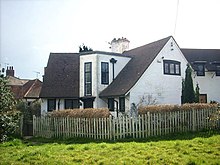Espérance Club

A sundial reading the motto, Let others tell of storms and showers, I tell of sunny morning hours, is on the south-east-facing wall
The Espérance Club, and the Maison Espérance dressmaking cooperative, were founded in the mid-1890s by Emmeline Pethick-Lawrence and Mary Neal in response to distressing conditions for girls in the London dress trade. The club was based at 50 Cumberland Market, in the St Pancras area of London.
Mary Neal had become fascinated by the folk songs and dances being collected by Cecil Sharp, and invited some traditional dancers to teach morris dancing to the young women of the Espérance Club. Thus was born the Espérance Morris, which inspired a modern London women's side, New Esperance Morris.
After donating a £1,000 legacy to the club and meeting Emmeline Pethick-Lawrence, Lady Constance Lytton was enthused by the women's movement and thus became a leading suffragette activist.[1][2]
References[]
- ^ BBC History, Profile of Lady Constance Lytton Archived September 5, 2007, at the Wayback Machine
- ^ Knebworth House, Lytton Family archives and History - Lady Constance Lytton and the Suffragettes Archived June 18, 2008, at the Wayback Machine
External links[]
- Smith, Mark K. (2005-03-30). "Emmeline Pethick, Mary Neal and the development of work with young women". the encyclopaedia of informal education. infed. Archived from the original on 2007-02-06. Retrieved 2007-05-02.
- Simkin, John. "Emmeline Pethick-Lawrence". The Emancipation of Women. Spartacus Educational. Archived from the original on 2007-04-09. Retrieved 2007-05-02.
- Dowling, Janet (2000). "So who was Mary Neal anyway?". Shave The Donkey. Archived from the original on 2007-08-08. Retrieved 2007-05-02.
- New Esperance Morris London based women's side continuing the tradition of Mary Neal
- Photograph of the Espérance Morris Dancers, ca. 1900 at New Esperance Morris
- Defunct clubs and societies of the United Kingdom
- English folk dance
- Folk dance stubs